
Lucius Annaeus Seneca the Younger, more commonly known simply as Seneca, made a lasting contribution to the philosophy of Stoicism. In part, his thoughts were responsible for the Renaissance revival of Stoic ideas, and he provides an approachable introduction to the philosophy for modern readers. This is why Seneca quotes have been increasing in popularity over the last few years.
When you read the works of Seneca, it’s worth understanding that he led a life where he had bountiful opportunities to reflect on the dangers of ambition, violent emotions, and the relationship between the life of philosophy and the life of politics.
Born in Hispana and raised in Rome, Seneca lived from around 4 BC to 65 AD. Exiled by one emperor (Claudius) and advisor to another (Nero,) Seneca was no stranger to the drama of Roman politics. He met his end after being accused of involvement in an assassination plot against the emperor and is remembered in countless paintings for his calm and stoic suicide, carried out at Nero's orders.
For those interested in incorporating Stoic thought into the way they live their lives, these Seneca quotes are a highly accessible place to begin. Let's take a look at some of the best quotes from the Stoic philosopher and peer into the mind of “the world’s most interesting Stoic.”
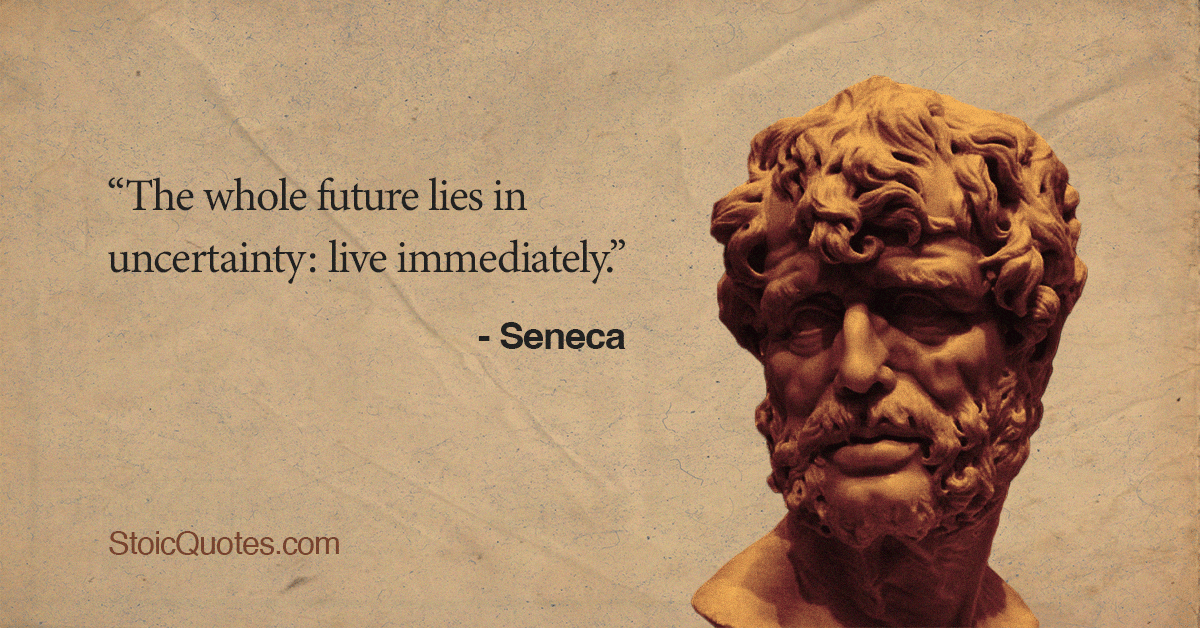
In the writings of Seneca, you can find countless pieces of wisdom that might help to guide you as you work to live a meaningful and virtuous life. He advocates for exercising control where you have it, i.e., in the present moment, rather than hanging all of your hopes and dreams on a future that isn’t here yet. At the same time, he is a proponent of being prepared for what could come down the road so that you can take advantage of opportunities as well as handle obstacles with strength and a sense of Stoic calm.
“Putting things off is the biggest waste of life: it snatches away each day as it comes, and denies us the present by promising the future. The greatest obstacle to living is expectancy, which hangs upon tomorrow, and loses today. You are arranging what lies in Fortune’s control, and abandoning what lies in yours. What are you looking at? To what goal are you straining? The whole future lies in uncertainty: live immediately.”
— Seneca
It’s all too easy to expend our energy fixated on what could happen in the future rather than using that energy to act in the present moment. In this quote, Seneca discusses the way that procrastination is in essence wasting the life we have. Too often, we are willing to deny ourselves our actual lived experience for the potential of what might happen someday down the road.
Seneca puts forward the idea that expectancy is our greatest impediment. It’s a trade where we forfeit today for tomorrow.
He further states that the present moment is what is in your control, while the future lies only in the hands of Fortune. In this way, you’re giving up the little control you have to forces that you are simply at the whim of. He argues that one should “live immediately,” that you should use today to take actionable steps towards your goals rather than submitting to some hope of good fortune in the uncertain future.
“As is a tale, so is life: not how long it is, but how good it is, is what matters.”
— Seneca
Seneca often argues that what makes a good life is a matter of quality, not quantity. Many of us are guilty of fearing death, and for this reason, we often act in order to avoid death to such an extent that we fail to live. But the point is that if you really live, if you really work to understand and carry out your purposes, the length of your life simply doesn’t matter.
If we really want something to fear, maybe we should consider being afraid of wasting our lives rather than dying young. What if you really accomplished the things you wanted to in life rather than being so risk avoidant that you always put your dreams off to some uncertain future? As Seneca says, the best stories aren’t defined by how long they are, but rather how good they are.
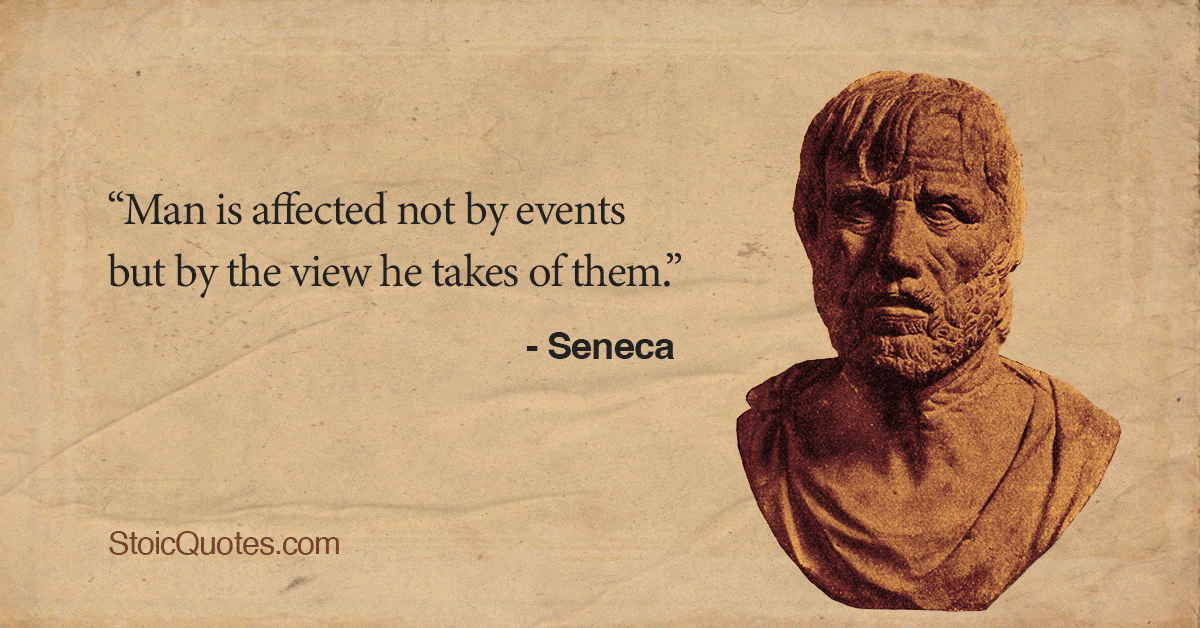
“Man is affected not by events but by the view he takes of them.”
— Seneca
We live in chaotic times, and it’s easy to constantly be so reactive to events that we act more like animals than like rational beings. However, it is an important belief in Stoicism that we have control over our perspectives, that we can change our experience by changing the way we view occurrences.
For example, let’s say you are fired from your job unexpectedly. In this case, no one would give you a hard time for feeling like you were dealt an unfair hand. You might rightfully feel betrayed that the future you once thought was there is no longer, and shaken by the imposed necessity of finding a new path in life.
In reality, though, that’s not the only way to look at it. Maybe you’ve been putting off starting your own business because you didn’t want to abandon the reliable income of your 9-5. Perhaps getting fired was the greatest gift you’ve ever received, allowing you to begin the life that you really want to live, the one you would have continued to put off if it weren’t for this secret blessing.
You can use this way of thinking towards just about any circumstance in your life that you view as negative. Let’s say that you are traveling for a weekend’s vacation and you get a flat tire along the way.
It’s easy to let our emotions overtake us in this type of moment. You think to yourself, “I’ve waited so long to take this trip and worked so hard to afford the money to make it possible. Why would this happen to me? It’s so unfair!”
At this moment, it’s good to remember that these initial passionate emotions aren’t the only way to perceive what has happened. For example, maybe you have been putting off checking the tire pressure on your car, and this actually serves as a necessary reminder to be more attentive to the things under your control. Or, perhaps a kind stranger pulls over to help you, with whom you engage in meaningful conversation and are exposed to new perspectives and ideas.
If you're interested in the potential power of controlling the way you react to the events that happen to you, another great resource is the best quotes of Epictetus. As a slave in his early life and a proponent of living simply, Epictetus offers invaluable insight into living a virtuous and happy life through understanding what is and isn't in your control.
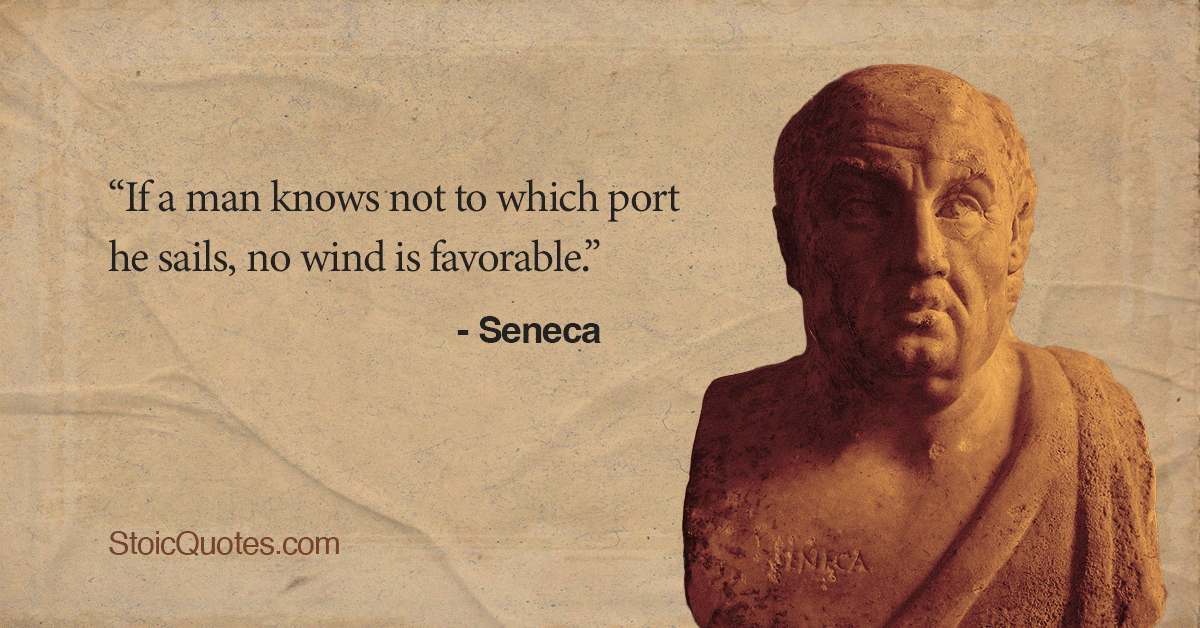
Seneca also offers profound advice when it comes to the topic of luck. To him, luck isn’t something that falls from the sky and graces someone with good fortune at random. Instead, it has to do with having clear goals and being prepared to recognize opportunity when it arises so you can act accordingly.
After all, even to win the lottery you have to have the foresight to buy a ticket.
“Luck is what happens when preparation meets opportunity.”
— Seneca
We are often guilty of claiming that people who are successful are simply lucky. By doing this, we take away any agency that those people had in creating their fate, and we also take responsibility away from ourselves in our quest to become successful. If success is just a matter of luck, it’s simply not our fault if we fail towards this end.
Seneca, though, argues that luck is actually the perfect brew that results when “preparation meets opportunity.” This puts being lucky firmly back within your control, in that you have control over the necessary preparations for your goal as well as the responsibility to recognize when an opportunity arises.
“If a man knows not to which port he sails, no wind is favorable.”
— Seneca
It is all too tempting to forfeit responsibility for your life to outside forces. These days, there are plentiful scapegoats that you can blame your misfortune on. Similarly, plenty of opportunities to hope that luck will shine down on you in its randomness, such as winning the lottery, becoming a world-famous actor, or having the perfect relationship drop in your lap.
At the end of the day, though, being lucky might not be as random as we might think. We can make ourselves feel better by blaming other people’s success on dumb luck, but this is likely not the case as often as we might want to think.
In this quote, Seneca succinctly encapsulates the idea that you have to have a desired destination in order to succeed in your goals. You have agency as a person, and having a sense of direction and purpose is necessary in order to live a life that you find fulfilling.
Seneca does not deny the occurrence of fortune, but he believes it is the timely intermingling of preparation and opportunity. If you want to “get lucky” in business, love, or life, you need to know where you are trying to go and prepare for the journey. Then, when the right winds come along, you’ll be well equipped to take advantage of them.
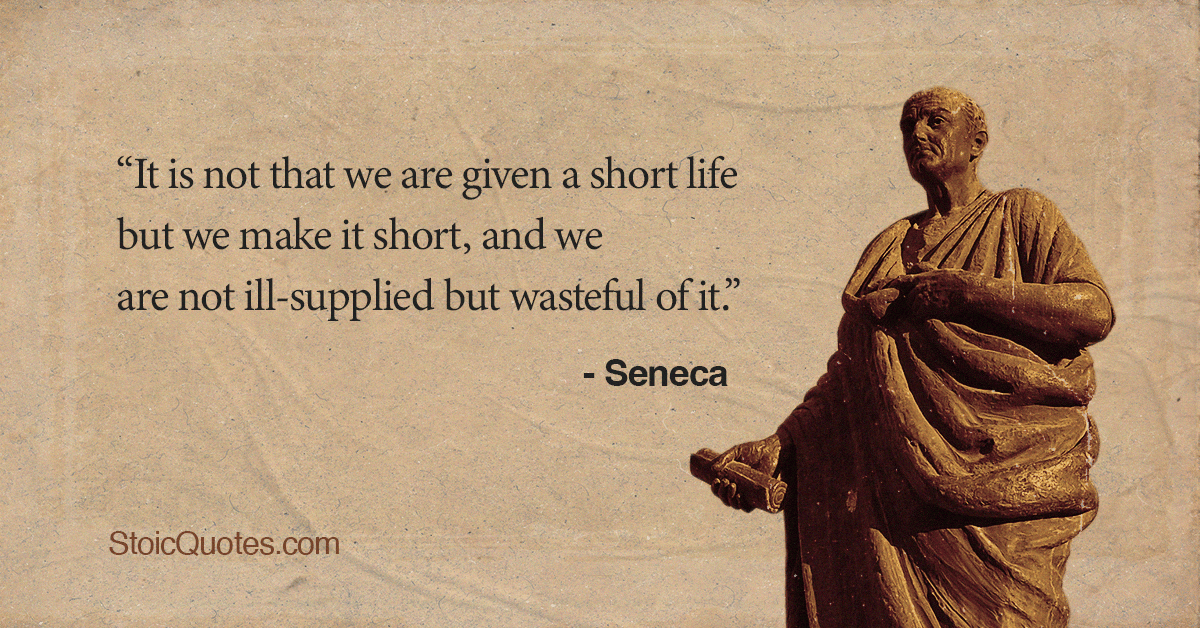
In our modern lives, it’s easy to feel like we are constantly battling with time. Maybe it seems like there's never enough time in the day, or perhaps you feel that time can’t move quickly enough in order for you to arrive at some future success.
Seneca argues that time not only heals the deepest of wounds and gives clarity to our problems, but also that we frankly waste a lot of our time rather than use it well. If you feel like time is your enemy, consider zooming out and viewing the reality of time from a grander perspective.
“We should always allow some time to elapse, for time discloses the truth."
— Seneca
Sometimes the things that happen to us in life are simply too complex or confusing for us to understand in the morning. We might experience the loss of a loved one, be betrayed by a lover, or otherwise suffer from some crippling occurrence. When you are overtaken by the extremes of emotion and despair, it’s worth reminding yourself that sometimes clarity requires that time passes.
If you ever feel overwhelmed by the circumstances of life, feel backed into a corner, or don’t see how you can move on from some terrible happening, remember the power of time. The feelings you have now won’t last forever, and, though it might be hard to see now, this experience might actually offer wisdom that serves to guide the rest of your life in a positive direction.
Another related Seneca quote is that “time heals what reason cannot.” In his Stoic philosophy, our Roman philosopher is a proponent of using reason to overcome grief and anger. However, here he admits that there are some troubles so profound that reason itself cannot adequately do the trick, and that the healing must come from the passage of time rather than the reasoning mind.
“It is not that we are given a short life but we make it short, and we are not ill-supplied but wasteful of it.”
— Seneca
Here Seneca pushes back against the notion that life is cruelly short. Instead, he argues that we are given plenty of time to live a good life, but we just don’t use it well.
If we’re honest with ourselves, we probably waste more time than we’d like to admit. Whether you escape from life through playing video games, watching TV, scrolling social media, doing drugs, or some other vice, there are likely many hours in each day that could be used in more virtuous ways.
What if we radically reconsidered how we used our time? What if instead of getting home from work and collapsing into a hedonistic and practically vegetative state, you created a plan for achieving your goals? What if, in doing so, a year from now you are able to look back and see just how much you have accomplished and grown?
Even the most fortunate people you know have likely done their fair share of suffering. Life’s difficulties find us all, no matter our status when it comes to wealth, beauty, or power. In the following quotes, Seneca discusses both the merits of the difficulties that arise in life as well as the key to overcoming grief.
“It is better to conquer our grief than to deceive it.”
— Seneca
This is a particularly important point to grasp when one is engaging in the world of Stoic philosophy. When you encounter Stoicism, it is perfectly forgivable to think that one is simply supposed to stuff down our grief and pain in order to live by Stoic principles. However, in this quote, Seneca helps to make the distinction between legitimately conquering one’s grief versus simply trying to fool ourselves into thinking we don’t grieve.
The Stoic way of dealing with passionate emotions like grief is not repressive. In fact, Seneca goes on to point up that if grief is “merely beguiled by pleasures and preoccupations” then it will reemerge and gain “force to savage us.”
He cautions against trying to distract yourself from your grief by traveling, fixating on your work, or manically picking up new hobbies. In his mind, these are just temporary methods of relief that deal with symptoms rather than the root cause. Instead, he argues that one must conquer grief with reason, as this is how you calm grief forever.
“Difficulties strengthen the mind, as labor does the body.”
— Seneca
Here Seneca points toward something that we all, at least at some level, know to be true. While we all wish that bad things don’t happen to us, we’ve also learned from first-hand experience that difficulties can be the most effective catalysts for self-improvement.
If you think back on your life and consider the occurrences that were the most trying, you’ll likely see that for all the pain they caused, they also made you less naive, more resilient, and wiser. If you don’t feel this way, it might be because you haven’t taken responsibility for the outcome of your own life yet, or it could mean that the healing power of time hasn’t quite worked its magic.
We all know that hard work and physical activity strengthen our bodies. Maybe you already practice weightlifting in order to meet this exact end in the absence of a physically laborious occupation. When you are met with hardship, consider integrating the idea that it is exactly this type of experience that provides the necessary strengthening of your mind in the same way that weightlifting leads to genuine strength in the body.
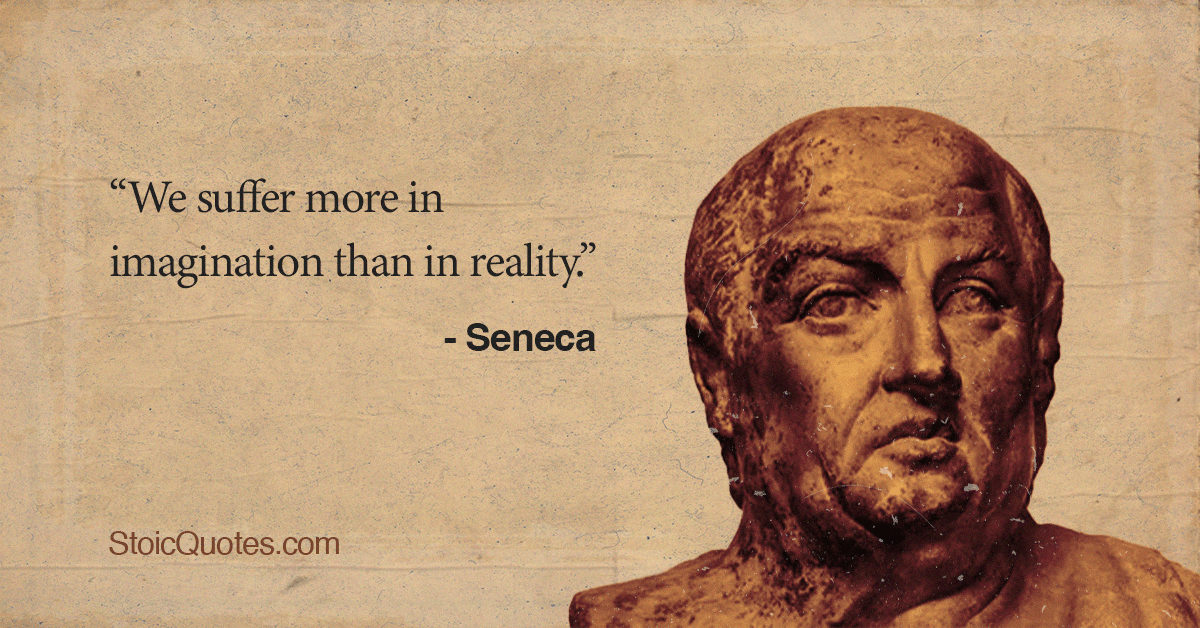
In the United States alone, there are 40 million Americans adults affected by anxiety disorders. Even if you don’t have a diagnosable anxiety disorder, though, there’s a good chance that you experience your fair share of anxiety from time to time. After all, the future is uncertain and it’s easy to fear the worst in situations both large and small.
The ideas of Stoicism can be particularly useful to people who struggle with anxious thoughts. What if you stopped burning energy worrying about what might happen and reinvested that energy into the parts of life you have control over? In all likelihood, you will have a richer, more successful, and more peaceful life.
“We suffer more in imagination than in reality.”
— Seneca
Have you ever spent hours, days, weeks, or even years agonizing over something that could potentially come to pass? In this quote, Seneca speaks to the way that we can be responsible for a great deal of our suffering thanks to incessant worrying about the future.
Before making this statement, Seneca says that “there are more things… likely to frighten us than there are to crush us.”
How many of your worst fears have actually come true? How much time have you spent in aggregate being anxious about things that never even happened?
This famous quote from Seneca calls to mind the words of Mark Twain: “Some of the worst things in my life never happened.” What if you could regain control over the time and energy you put into worrying about the future and instead used those resources towards creating the life you want to live and becoming the person you want to be?
“It’s ruinous for the soul to be anxious about the future and miserable in advance of misery, engulfed by anxiety that the things it desires might remain it’s own until the very end. For such a soul will never be at rest— by longing for things to come it will lose the ability to enjoy present things.”
— Seneca
When we are anxious about the future, we are inherently worrying about things that might never come to pass. If our worst fears do come true, we are actually just creating more misery for ourselves, as we are miserable in the anxiety as well as the outcome.
On top of that, being anxious strips you of your ability to recognize and appreciate the good things that are in your life presently. Maybe you’re so anxious about your career that you’re unable to enjoy your relationships, your pet, or the wool sweater that protects you from the cold morning air. There are always things to be grateful for, even in our darkest hours, and being anxious about the future only serves to steal our ability to be appreciative in the present moment.
“For the only safe harbor in this life’s tossing, troubled sea is to refuse to be bothered about what the future will bring and to stand ready and confident, squaring the breast to take without skulking or flinching whatever fortune hurls at us.”
— Seneca
If you consider yourself an anxious person, this idea could radically change your life. Perhaps you currently feel at the whim of forces that are beyond your control, whether that’s your boss, your landlord, your family, or world events.
Imagine for a moment how different life could be if you defiantly refused to be anxious about the future. In exchange, you must work to better yourself so that you are confident and strong in the face of the surprises life throws our way.
It’s possible to encounter life as a Stoic warrior rather than a meek servant. While it can take time and effort to undo years of anxious habits, it could free up countless hours that you previously spent worrying about things you weren’t even sure would happen.
With each hardship that befalls you, work to stand with your shoulders back in the face of the obstacle. Over time, you’ll find that every struggle strengthens your mind and that your increasing freedom from anxiety allows you to be ever-more prepared for what actually does happen in life.
According to an Axios poll, 69% of men and 57% of women desire to live past their respective average life expectancies. Is living a longer life mean living a better life, though? Is it possible that focusing on avoiding death can actually keep you from truly living?
Seneca thinks so. He pushes back on the notion that a life cut short is inherently incomplete. Instead, he advocates for the idea that there is never such thing as death that comes too soon if the person has lived honorably.
“Life is never incomplete if it is an honorable one. At whatever point you leave life, if you leave it in the right way, it is whole.”
— Seneca
In modern society, we often think that one of the main goals of life is to live for a long time. We are, perhaps rightfully, extra sorrowful about those who seem to pass before their time. However, Seneca puts forward an idea here that there is no such thing as a “life cut too short” if the person lived with fullness and honor.
If you look around at your office, the grocery store, or the gym, you’ll likely see the faces of many people who are consciously or unconsciously guided by the fear of death. However, when you think of many of the heroes of history, you’ll learn that greatness does not necessarily come with age, but with legitimate engagement with life.
One famous world figure that comes to mind here is Alexander the Great. Dying of uncertain causes at the young age of 32, he had built one of the largest empires in all of history by the age of 30. Whether or not you think that his lengthy military campaign was an honorable cause, no one can deny the magnitude of this accomplishment for such a young man.
Rather than focusing on living to be 100, what if you worked to make your minutes count now? What if you lived your life so that no matter what eventually befalls you, you will have peace knowing that you used your time well?
“Let us prepare our minds as if we’d come to the very end of life. Let us postpone nothing. Let us balance life’s books each day. The one who puts the finishing touches on their life each day is never short of time.”
— Seneca
Seneca once referred to death as “the one law… that is free of all discrimination.” It doesn’t matter how rich you are, how beautiful you are, or how healthy you are– you’re going to die someday just like everyone else. While we might flinch a little at this notion and quickly shift away from it in our consciousness, it’s possible to embrace the reality of death as something that helps you live a full life.
In this quote, Seneca puts forward the idea of incorporating the idea of death into our everyday lives. If you imagine yourself at the end of your life, you can likely picture what you will wish you had done and what you will have been glad to have done. Now, if you can incorporate the idea that each day might be your last, you might finally find the motivation to act towards your goals rather than putting them off for a future that may never arrive.
You can find similar ideas echoed in the writing of another famous Stoic philosopher, Marcus Aurelius. This great emperor of Rome proposed that one should "let each thing you would do, say, or intend, be like that of a dying person."
Seneca was not just a philosopher that buried himself in books and lived inside his head. You don’t have to read far into his biography to see that the life he led was exciting, dramatic, and filled with opportunities to contemplate passionate emotion as well as the virtue and vice of man. His tumultuous life involved being exiled, tutoring and advising the famously nasty emperor Nero, and being forced to commit suicide by his powerful former student. At the end of the day, while Seneca might be one of the more controversial Stoic philosophers, it's clear that he lived by many of the principles that he proposed in his writings.
These Seneca quotes offer some truly profound advice when it comes to leading a good life, understanding what is in your control and what isn’t, and freeing ourselves of anxiety. While his writings are an accessible way to become introduced to the ideas of Stoic philosophy, there is a lot of potential depth to explore in the world of Stoicism. For more resources that can help you transform your life, check out StoicQuotes.com.
We encourage you to share this article on Twitter and Facebook. Just click those two links - you'll see why.
It's important to share the news to spread the truth. Most people won't.